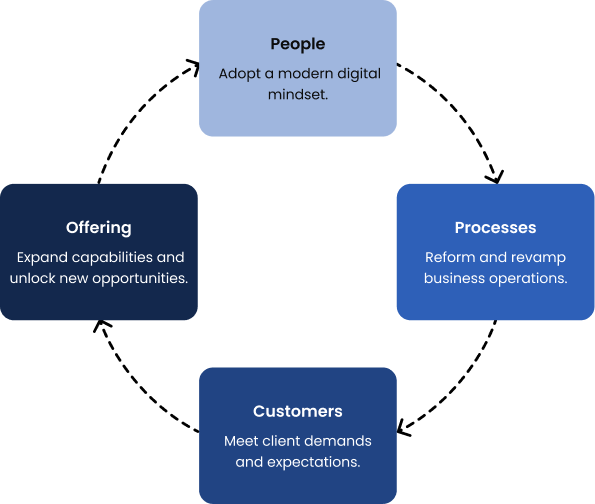What is Digital Transformation?
Digital transformation is crucial for maintaining the competitive advantage of your business in the modern age. It involves fundamentally reforming your business operations by incorporating the latest technologies to enhance overall efficiency.
Integrating these changes into all aspects of your organization’s operations significantly improves how you deliver value to customers. Boost customer experience and unlock the next level of success with Blue Ocean Global Technology’s digital transformation consulting services.
Why Do You Need Digital Transformation?
Starting your business’s digital transformation is crucial not only for success in the age of digitization but also for sustaining your business’s continued success. Technology is increasingly fused with business operations globally and remains an ever-changing component of modern business. Maintaining a contemporary digital mindset is vital for the survival and growth of your organization as a whole.
Your own perspective, along with that of your company and its employees, must adapt to navigate the evolving digital landscape to understand, serve, and cater to your clients more effectively. This is to mitigate the likelihood of being left behind, staying competitive in the market.
Digital transformation in the federal government space, for example, facilitates highly efficient services that meet the unique needs of individuals. It enhances public service engagement, maximizes the data systems’ utility to replace outdated archiving methods, streamlines processes seamlessly, and enables well-informed decisions based on data.
Client Engagements
Blue Ocean Global Technology offers a customer and people-centric approach to digital transformation. We understand that the individuals who make up the organization are important for its success. Every team member must feel empowered by the transformation you aim to achieve. Once implemented, optimizing your organization’s processes sets the focus on delivering the best services for your clients and consistently meeting their demands.
Successful transformation involves commitment from every level of management for an effective top-down approach. Comprehensively addressing the unique challenges of digital transformation for every organization, Blue Ocean Global Technology designs a transformation strategy exclusively based on specific aspects of your business that require revamping. By eliminating inefficiencies and identifying successful strategies, we ensure your competitiveness in the digital age.

How Will Digital
Transformation Help You?
Your digital transformation process works best with the right partnership. By providing the objective perspective of your business needs, Blue Ocean Global Technology’s Digital Transformation Consulting Services implements necessary changes one step at a time.
Digital
mindset
Update your approach.
High
efficiency
Eliminate repetitive tasks.
Lower
costs
Minimize costs in outdated systems.
Quality
service
Enhance client offerings.
Customer
experience
Meet clients’ expectations.
Competitive
advantage
Unlock opportunities, eliminate barriers.
for your
Digital Transformation needs.
Discover How We Can Elevate Your Success




Related Reads
FAQs
Digital Transformation new
- What are the top 3 trends of digital transformation?
The top three trends of digital transformation include the use of artificial intelligence, task automation, and cybersecurity. These improve business efficiency and erase redundant tasks. Cybersecurity is the crucial cornerstone of digital transformation. When shifting to a digital landscape, companies tend to utilize cloud systems to store data. Taking proper cybersecurity measures is necessary for keeping sensitive information safe.
- How is digital transformation changing business models?
Digital transformation contributes to the creation of new business models such as crowdfunding, freemium, and ad-supported businesses. These strategies and models help businesses to maintain relevance. Overcoming geographical barriers through digitization, newer business models are able to offer a variety of services globally.
All businesses must balance their vision of digital transformation and company growth. Investing in employee training about navigating digital tools has become increasingly imperative. Business leaders must adopt a mindset that supports innovation and education to ease the process of adapting to change and understanding the risks of digital transformation.
- How can digital transformation affect my business?
It’s a form of strategic change that aims to unlock multiple benefits for your business including increased efficiency, lower expenses, and higher revenue. Adapting to the ever-changing digital landscape helps your business maintain a competitive edge. Through improved efficiency, businesses improve customer experience and make more informed decisions. Shifting your business operations to a digitally advanced one is imperative to maximize its overall benefits.
Recently, there has been a history of companies that bounce back from poor performance and gain an edge over their competitors by shifting to a digital business model. Digital transformation can generate newfound momentum and progress for any business.
- How does a business develop digital transformation strategies?
To develop a successful digital transformation strategy, it remains crucial to understand your business’ specific requirements. Doing so using existing in-house resources may suffice in some cases, but the most efficient method is through an external and experienced consultant.
The first step involves overseeing the required changes, improvements, and what works efficiently as is. Without a proper evaluation of existing processes, a transformation strategy might do more harm than good. As third-party experts who advocate for your company’s success, external consultants provide a more objective examination of your business to recommend best practices. After understanding the requirements and what they entail, an experienced consultant can help develop a plan of action tailored to specific tasks.
- Why is digital transformation important for the business industry?
Digital transformation is not just about purchasing and implementing new technology systems. It is the process of integrating technology into a company’s business operations as part of its culture and strategy which all stakeholders embrace. Transformation is required to keep up with digitization. If not, there remains a risk of getting left behind.
Utilizing the right technology can help you serve customers better, streamline business operations, and increase efficiency to cut costs. The use of technology to collect, process, and analyze data can help create opportunities for innovation and harness insights to reach new markets.









